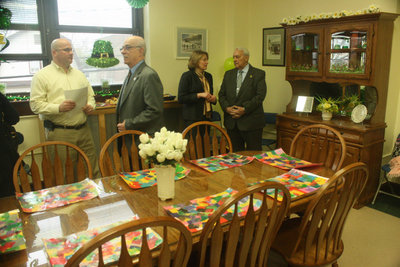Although he is primarily regarded for his years of dedication as a Jersey City firefighter, Brian “Buck” Ellerson tried hard during his lifetime to help kids.
He was a huge fan of the New York Yankees and the New York Giants, and his two sons seemed to live up to his dreams, Brian Jr. as a student at Hudson Catholic High School and Sean as a top notch pitcher for Bayonne High School.
But even after his untimely death from cancer two years ago, Buck continues to help kids. In this case, the new life skills classroom for autistic children at Washington Community School will bear his name.
“We all know Buck Ellerson was a hero in blue, but now he’s also a hero to the 100 children at Washington Community School that will have fun using this room daily to make delicious cookies and chocolate desserts, to say the least,” said Schools Superintendent Dr. Patricia McGeehan at the March 21 dedication of the new classroom.
Jersey City Mayor Jerramiah Healy joined Bayonne Mayor Mark Smith in honoring Ellerson, and paying tribute to the family who came to witness the ribbon cutting on March 21.
Life Skills rooms, which are dedicated to the 10 self-contained classes included in the Bayonne School District’s Life Skill Centers program, allow kids with autism to be taught the basic skills that will eventually allow them to make their way into the wider world beyond school.
This program in two elementary schools, Woodrow Wilson and Washington Community, is the middle piece in a comprehensive series of programs in Bayonne that help autistic kids from pre-school through to high school and even somewhat beyond.
For pre-school kids, Bayonne has the Busy Bee Center for Children with Autism, located at Bayonne Medical Center, an early intervention program that has existed for ten years. This is a cooperative effort of the Bayonne Medical Center, the Bayonne Board of Education, and the Simpson Baber Foundation.
“In the district, we also have centers at Bayonne High School and Woodrow Wilson School, sponsored by the Simpson Baber Foundation,” Dr. McGeehan said, noting that the Washington Community School class marks another successful education initiative.
Marguerite Baber, who founded Simpson Baber Foundation, said that raising funds for the classroom and the dedication of the room to the family of the historic firefighters helps the kids and raises awareness in the community of the challenges autistic kids face.
“The new life skills room will help these kids.” – Marguerite Baber
__________
Developing in a different way
Autism impairs brain development in the areas of social interaction and communication and impacts one out of every 88 children. Symptoms could include inappropriate play; extreme social withdrawal; intense discomfort with new situations, people or surroundings; preoccupation and fixation; or behavioral problems.
Autism is a nightmare for parents because children don’t follow the usual progression expected. Caught up in their own mental loop, autistic children do not develop in a typical way, learning lessons from experience the way most children do. They can learn and develop, but often this is a time-consuming and very frustrating effort.
This classroom, which is under 400 square feet, includes a refrigerator, stove, dishwasher, clothing washer and dryer, dining tables and counters and is designed to establish routines that these kids will later carry into their every day lives.
These students learn the basic things they will need to survive out in the world, how to look for and find what they need, and how to count their change. These are lessons in life skills and how to make everyday decisions.
Dr. McGeehan said part of this process is to get these kids used to real life conditions, which includes noisy places and flickering lights, both of which often have negative effects on people with autism.
Starting with the Busy Bee program, students then come into the elementary school, where they continue to build a base of experience to carry on into the high school, where an even more comprehensive program helps them learn working skills.
The more the students do here in elementary classes to learn the basic lessons of life, the better prepared they are to begin using them in a social setting where many of them go off to unpaid and paid internships with local businesses.
At the high school, each student gets a vocational assessment, giving educators an idea of the level of skills. Some may go on to college. Some may go into trade schools. Some may even transition into jobs or into programs where they can continue to use the skills they learned here.
Baber said she was grateful for the turnout at the dedication, and she believes that the new classroom will fill a very critical need for students struggling with autistic issues.
“The new life skills room will help these kids,” Baber said.
